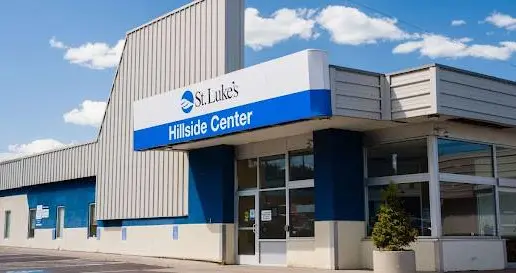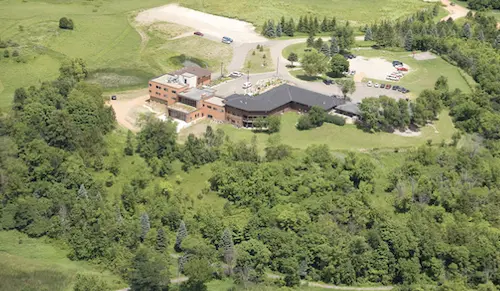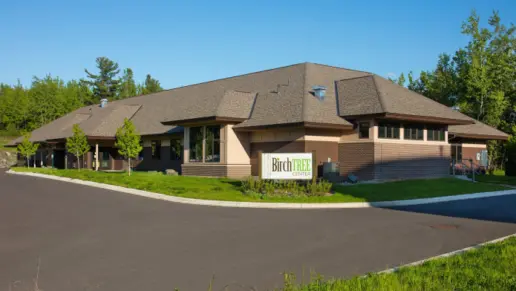I went there last year. Im happy to say I’m still sober and I owe a lot of that to them!!!
About Beauterre Recovery Institute
Beauterre Recovery Institute is a CARF accredited luxury substance abuse and mental health treatment center. It’s located in Owatonna, Minnesota, on 180 acres of prairie land not far from Minneapolis-St. Paul. They accept insurance from most providers even if they’re not in network. However, they are in network with some of the big providers such as Aetna and UnitedHealthcare. They don’t accept Medicaid or Medicare.
They can assist with detox in some cases, but they don’t have a full inpatient medical detox program. They do have a coed residential program for adults 18 and over. They have a special recovery program for licensed professionals.
The inpatient program starts with an intake which includes personality and medical assessments. The intake helps staff design a custom treatment plan that includes treatment for any co-occurring mental health disorders.
The program uses many types of individual and group therapy; therapies for the mind, body and spirit; and therapeutic recreational approaches. Some of the treatment modalities include dialectical behavior therapy (DBT), cognitive behavioral skill building groups, health realization and 12 Step programming. You’ll get nutritional guidance and learn mindfulness meditation.
They use SMART (self management and recovery training) which is an evidence based method of recovery that uses cognitive behavioral therapy (CBT) to transform negative behaviors into positive behaviors. It helps you learn good coping skills to manage cravings and urges as well as manage your feelings, thoughts and behavior.
You’ll be encouraged to stay physically active as part of your recovery. They have a gym with some weights and cardio machines. The grounds are spacious and provide a good place to walk or run. You’ll have the opportunity to play volleyball, basketball and horseshoes, attend yoga, or walk the labyrinth.
Former clients have high praise for the treatment center, noting the knowledgeable staff and great food. One client said the dual diagnosis education was “very in depth” and helpful for overcoming addiction successfully.
Facility Overview
Rehab Score
Gallery

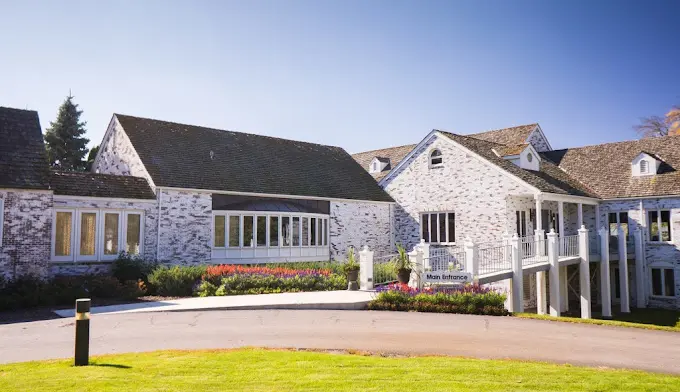
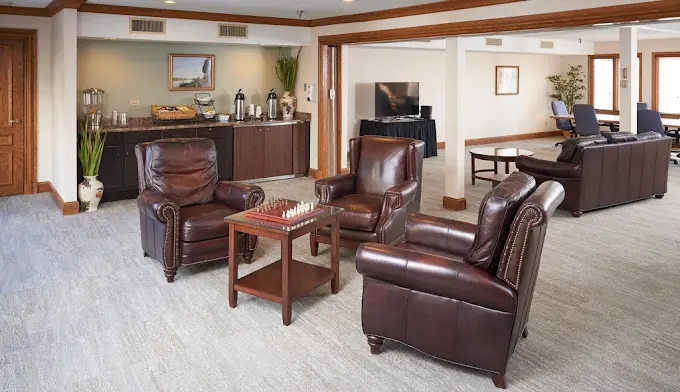


Location
Accepted Insurance





Other Forms of Payment
Private insurance refers to any kind of healthcare coverage that isn't from the state or federal government. This includes individual and family plans offered by an employer or purchased from the Insurance Marketplace. Every plan will have different requirements and out of pocket costs so be sure to get the full details before you start treatment.
Self-pay involves paying for treatment out of your own pocket. You can use savings or credit, get a personal loan, or receive help from family and friends to fund your treatment. If you don't have insurance or your insurance plan doesn't cover a specific program, self-pay can help ensure you still get the care you need.
Addiction Treatments
Levels of Care
Treatments
The goal of treatment for alcoholism is abstinence. Those with poor social support, poor motivation, or psychiatric disorders tend to relapse within a few years of treatment. For these people, success is measured by longer periods of abstinence, reduced use of alcohol, better health, and improved social functioning. Recovery and Maintenance are usually based on 12 step programs and AA meetings.
Drug addiction is defined as an inability to stop using drugs even though it causes negative consequences in your life. Drug rehab in Minnesota provides treatment for drug addiction in a variety of settings including inpatient treatment and outpatient treatment.
Many of those suffering from addiction also suffer from mental or emotional illnesses like schizophrenia, bipolar disorder, depression, or anxiety disorders. Rehab and other substance abuse facilities treating those with a dual diagnosis or co-occurring disorder administer psychiatric treatment to address the person's mental health issue in addition to drug and alcohol rehabilitation.
Opioid rehabs specialize in supporting those recovering from opioid addiction. They treat those suffering from addiction to illegal opioids like heroin, as well as prescription drugs like oxycodone. These centers typically combine both physical as well as mental and emotional support to help stop addiction. Physical support often includes medical detox and subsequent medical support (including medication), and mental support includes in-depth therapy to address the underlying causes of addiction.
Substance rehabs focus on helping individuals recover from substance abuse, including alcohol and drug addiction (both illegal and prescription drugs). They often include the opportunity to engage in both individual as well as group therapy.
Programs




Clinical Services
Qualified therapists in Minnesota offer individual therapy to men and women so they can receive customized care tailored to their needs. Your therapist works to understand your unique circumstances and provide you with targeted interventions and coping skills essential for long term recovery.
People benefit from group therapy sessions that offer them the chance to learn and practice conflict resolution skills with their peers. This helps you recognize your strengths and capabilities, which boosts your self confidence as you work toward overcoming addiction and building a healthier lifestyle.
Research clearly demonstrates that recovery is far more successful and sustainable when loved ones like family members participate in rehab and substance abuse treatment. Genetic factors may be at play when it comes to drug and alcohol addiction, as well as mental health issues. Family dynamics often play a critical role in addiction triggers, and if properly educated, family members can be a strong source of support when it comes to rehabilitation.
Trauma therapy addresses traumatic incidents from a client's past that are likely affecting their present-day experience. Trauma is often one of the primary triggers and potential causes of addiction, and can stem from child sexual abuse, domestic violence, having a parent with a mental illness, losing one or both parents at a young age, teenage or adult sexual assault, or any number of other factors. The purpose of trauma therapy is to allow a patient to process trauma and move through and past it, with the help of trained and compassionate mental health professionals.
Amenities
-
Private Rooms
Staff

Treatment Director

MD

Nurse Manager

Program Coordinator
Contact Information
2480 South County Road 45
Owatonna, MN 55060




